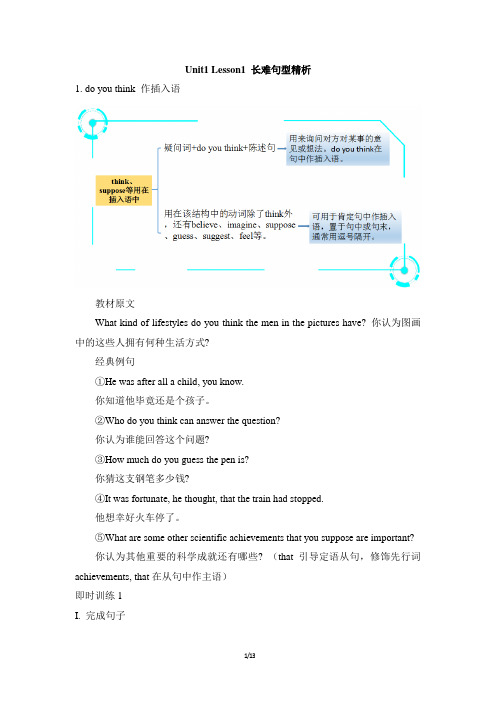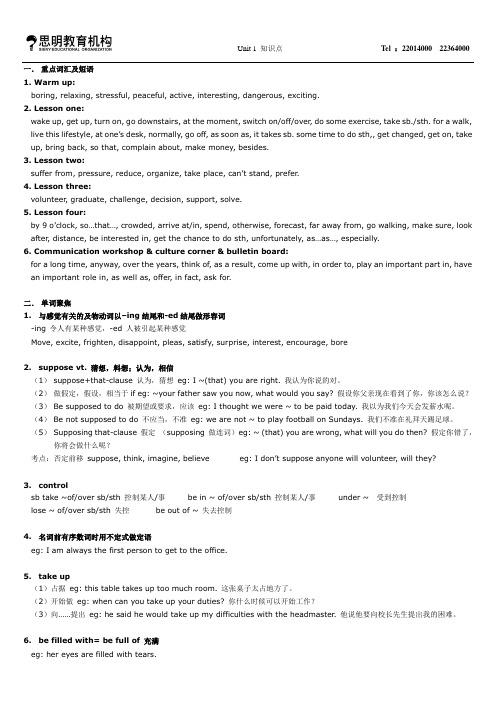北师大版高一英语 unit1 lesson1语法
- 格式:wps
- 大小:23.00 KB
- 文档页数:3

Unit1 Lesson1 长难句型精析1. do you think 作插入语教材原文What kind of lifestyles do you think the men in the pictures have? 你认为图画中的这些人拥有何种生活方式?经典例句①He was after all a child, you know.你知道他毕竟还是个孩子。
②Who do you think can answer the question?你认为谁能回答这个问题?③How much do you guess the pen is?你猜这支钢笔多少钱?④It was fortunate, he thought, that the train had stopped.他想幸好火车停了。
⑤What are some other scientific achievements that you suppose are important?你认为其他重要的科学成就还有哪些? (that引导定语从句,修饰先行词achievements, that在从句中作主语)即时训练1I. 完成句子1. 你认为他们正在谈论什么呢?What do you suppose ?2. 你猜他们什么时候从公司回来?they will come back from the company?Ⅱ. 翻译句子1. 你认为谁帮我交了作业?2. 你认为他会怎样处理这些奖金?3. 你知道他住哪里吗?4. 我想你应该向她道歉。
答案:I. 1. they are talking about 2. When do you guessⅡ. 1. Who do you think helped me hand in my homework?2. What do you think he will do with the prize money?3. Where do you know he lives?4. You should, I think, apologize to her.2. while表示“转折”教材原文I always take my portable TV and I sit on the stone wall while the dog walks round in a circle. 我总是随身携带着手提电视,坐在石墙上,小狗则在旁边绕圈。

北师大版高一英语第一章知识点总结
北师大版高一英语第一章主要介绍了英语语言学习的基本知识和
技能,包括英语的母语定式、意义、语法和句子结构等方面。
其主要
知识点总结如下:
1.词法:包括单词的词头、词尾、词根等构成部分,以及单词的
词义、词性等。
2.语法:主要包括句子的构成和句子成分的用法。
句子构成方面,包括主谓结构、主从结构、并列结构等。
句子成分用法方面,包括名词、代词、形容词、副词、动词等的语法用法。
3.语义:主要包括单词和句子的意义。
单词的意义可以通过词义、词汇搭配、上下文等方式理解。
句子的意义可以通过句子成分、句子
结构、上下文等方式理解。
4.关系:主要包括词汇关系、句子关系和段落关系等。
词汇关系
包括同义词、反义词、上下义词等。
句子关系包括因果关系、条件关系、转折关系等。
段落关系包括主题句、扩展句、总结句等。
5.阅读技巧:包括选词填空、判断正误、阅读短文等技巧。
6.写作技巧:包括写作结构、段落写作、适当使用连词、标点符号等技巧。

一.重点词汇及短语1. Warm up:boring, relaxing, stressful, peaceful, active, interesting, dangerous, exciting.2. Lesson one:wake up, get up, turn on, go downstairs, at the moment, switch on/off/over, do some exercise, take sb./sth. for a walk, live this lifestyl e, at one’s desk, normally, go off, as soon as, it takes sb. some time to do sth,, get changed, get on, take up, bring back, so that, complain about, make money, besides.3. Lesson two:suffer from, pressure, reduce, organize, take place, can’t stand, pre fer.4. Lesson three:volunteer, graduate, challenge, decision, support, solve.5. Lesson four:by 9 o’clock, so…that…, crowded, arrive at/in, spend, otherwise, forecast, far away from, go walking, make sure, look after, distance, be interested in, get th e chance to do sth, unfortunately, as…as…, especially.6. Communication workshop & culture corner & bulletin board:for a long time, anyway, over the years, think of, as a result, come up with, in order to, play an important part in, have an important role in, as well as, offer, in fact, ask for.二.单词聚焦1.与感觉有关的及物动词以–ing结尾和-ed结尾做形容词-ing 令人有某种感觉,-ed 人被引起某种感觉Move, excite, frighten, disappoint, pleas, satisfy, surprise, interest, encourage, bore2.suppose vt. 猜想,料想;认为,相信(1)suppose+that-clause 认为,猜想eg: I ~(that) you are right. 我认为你说的对。

P71.boring---interesting busy—freedangerous—safe(adj) danger—safety(n)active/outgoing—timid/shy lazy—diligent/hardworkingexciting—peaceful relaxing—stressful2.tennis player(队员) team member 队员P81.relax v. 使轻松sth relax sb sth使sb轻松bore v.使厌烦sth bore sb sth使sb厌烦excite v使激动sth excite sb sth使sb激动relaxing/boring/exciting adj. 令人放松/厌烦/激动的(修饰物)sth is relaxing/boring/exciting, a relaxing/boring/exciting movierelaxed/bored/excited adj. 感到放松/厌烦/激动的(修饰人)sb feel/be /get/become relaxed/bored/ excited**规律:动词v+ed/ing=形容词adj, (其中v-ing还可以是动名词,当名词用)2.suppose V. 认为,推断,料想;sb suppose (that)+句子 sb认为suppose sb./sth./ (to be) +adj./n. 认为某人/某物…I don’t suppose (that)…我认为….不…(否定前移)I suppose (I think ) 我认为…Sb/sth be supposed to do/be …(按规定,习惯,安排等)sb/sth理应do sth……,应该是……;Sb be not supposed to do sth. 不应当…,不准……,不得be supposed to have done 本应该已经做而实际上未做。

[键入文字]
北师大版高一英语必修1Unit1 Lifestyles重点语法
学习英语语法是很重要的,以下是高一英语必修1Unit1 Lifestyles重点语法的内容,请参考。
A rolling stone gathers no moss. ([谚]流水不腐。
) 2.表经常习惯性动作。
Father doesn’t smoke.
He always sleeps with his windows open. 3.表现在的行为或状态。
Someones at the door. Whats the matter with you? 4.表主语所具备的特点,特征或能力。
Tom speaks good English.
5. 常用于时间、条件、让步状语从句,表将来,即经常说到的主将从现。
If it is fine tomorrow,well go to the countryside. Well go out for a walk as soon as the rain stops.
6. 用于根据规定或时间表预计要发生的动作,只限于go,come,leave,start,stay,begin,close,open等动词。
The train leaves at 7∶30 this evening. The term starts on 23rd August.
现在进行时
- 用法
1。

北师版高一英语必修一第一单元知识汇总北师版高一英语必修一第一单元知识汇总第一单元是高一英语的第一个单元,包括了课文的阅读、语法的学习以及词汇的积累等内容。
下面是对这个单元的知识点进行汇总的详细介绍。
1. 课文阅读本单元的课文是《Unit 1 Friendship》和《Unit 1 Friendship》的延伸阅读。
这两篇课文主要讲述了友谊的重要性以及如何建立和维护友谊的方法。
通过阅读这两篇课文,可以学习到一些表达友谊和感激之情的常用句型和词汇。
2. 语法学习本单元的语法学习主要包括了三个方面的内容:一是情态动词的用法,二是虚拟语气的用法,三是倒装句的用法。
情态动词是英语中常用的一类动词,包括can、could、may、might、shall、should、will、would、must等。
这些动词在句子中一般用来表示说话人的态度、可能性、推测等。
在使用情态动词时需要注意其时态和语态的变化。
虚拟语气是一种语气,在英语中用来表示与事实相反或与现实相反的假设、愿望、建议等。
虚拟语气的形式包括过去式、过去完成式和虚拟语气的特殊句型。
倒装句是英语中的一种句子结构,一般是将谓语动词或助动词放在主语之前,常用于强调句子的某个成分或表示条件、让步、地点等。
倒装句的形式有完全倒装和部分倒装两种。
3. 词汇积累本单元的词汇积累主要包括了以下几方面的内容:一是词义辨析,二是固定搭配,三是词汇拓展。
词义辨析是指对于一些词汇的不同含义进行辨析和运用。
在学习词义辨析时需要注意词义的差异和上下文的语境。
固定搭配是指一些词汇在搭配时常常与特定的词汇搭配使用。
学习固定搭配时需要注意记忆和运用这些固定搭配。
词汇拓展是指通过学习某个词汇的派生词、同义词、反义词等对其进行拓展,进一步丰富词汇量和语言表达能力。
以上就是对北师版高一英语必修一第一单元知识的汇总介绍。
通过对这些知识的学习和掌握,可以提高自己的阅读理解能力、语法运用能力以及词汇积累能力,为后续学习打下坚实的基础。
Unit1 单元语法详解一般现在时与现在进行时一、一般现在时1. 一般现在时主要由动词的原形表示,如果主语是第三人称单数,谓语用单数。
2. 基本用法(1)表示习惯性、经常性的动作。
常与表示频率的词或短语如always、every time、now and then、occasionally、often、seldom、sometimes、usually、once a month 等连用。
I leave home for school at 7:00 every morning.我每天早上七点从家去学校。
He often watches football matches at home.他经常在家看足球赛。
即时训练1用括号内单词的适当形式填空1. He seldom (go) to the cinema.2. -How often you (go)back to see your parents?-Once a week.答案:1. goes 从seldom看,这里表达经常性的动作。
注意主语是第三人称单数,因此谓语用单数。
2. do;go 从空前的often看,这里表达习惯性动作,因此用一般现在时。
一般疑问句是将助动词do提前。
(2)表示持久的状态、个性、性质、能力。
I love to get together with my friends.我喜欢和朋友在一起。
Wang Min writes good English but does not speak well.王敏英语写得很好,但说得不好。
即时训练2完成句子1. He (喜欢打篮球).2. Who (它属于)?3. The cloth (容易洗).4. Water (结冰)at 0℃.答案:1. likes playing basketball 此处表达某人的喜好,因此用一般现在时。
主语是第三人称单数,因此谓语用单数。
2. does it belong to 此处表达所属关系,因此用一般现在时。
Lesson1 重点考点精讲练考点1 suppose vt.认为,猜想教材原句Let's suppose what he said to be a fact, how will we deal with it?咱们假定他的话是事实,那么我们将如何应对呢?—Do you suppose it is going to snow?你认为会下雪吗?—I suppose so/not.我想会吧。
/我想不会。
[归纳拓展]I suppose so (not).我想是(不是)。
be supposed to do sth.被期望做……,应该做……be supposed to be 被认为/猜想/假设是do you suppose 你认为……suppose/supposing (=if) 假如,假定假如他失业了,他的孩子们怎么办?You're not supposed to smoke in this building.你不可以在这幢楼里吸烟。
[多角度演练]1.完成句子①He's supposed_to_be (应该在) there on time.②Suppose/Supposing (假设) he doesn't come, what shall we do?③I don't suppose anyone will volunteer, will_they (是吗)?④You are_not_supposed (不允许) to make loud noises here.2. 单项填空⑤(2011·辽宁高考)What are you doing out of bed, Tom? You're________to be asleep.A.supposed B.knownC.thought D.considered解析:考查固定短语。
句意:汤姆,你下床做什么?你应该睡下了。
Unit 1 Lifestyles 讲义Lesson 1 A perfect day1. 一般现在时主要用于表示人、事物现在状况和特点;表示经常或习惯性的动作,句中常有often, always, from time to time 等时间状语;表示客观规律和永恒真理等。
He usually goes to work at 7 o’clock every morning.他通常每天早上7点钟去上班。
The earth goes around the sun.地球围绕太阳转。
表示永恒的真理,即使过去的语境中,仍用一般现在时。
I learned that the earth goes around the sun when I was in primary school.我在小学就知道地球围绕太阳转。
在时间、条件和让步状语从句中,一般现在时可以代替一般将来时。
If he accepts the job, he will get more money soon.如果他接受了这份工作,不久就会赚更多的钱。
在make sure (certain), see to it, mind, care, matter +宾语从句中,从句用一般现在时代替一般将来时。
So long as he works hard, I don’t mind when he finishes the experiment.只要他努力工作,我不介意他什么时候做完试验。
在the more… the more… (越......越......)句型中,若主句是一般将来时,从句通常用一般现在时。
The harder you study, the better results you will get.你学习越用功,成绩就越好。
2. 现在进行时的基本用法:a. 表示现在( 指说话人说话时) 正在发生的事情。
We are waiting for you.b. 习惯进行:表示长期的或重复性的动作,说话时动作未必正在进行。
一、单选
1 Jenny ____ in an office. Her parents ____in a hospital.
A work works
B works work
C work are working
D is working work
2 One of the boys_____ a black hat.
A have
B there is
C there are
D has
3 We will go shopping if it____ tomorrow.
A don't rain
B didn't rain
C doesn't rain
D isn't rain
4 He said the sun ____in the east and ____in the west.
A rose; set
B rises; sets
C rises, set
D rise; sets
5 Wang Mei ____ music and often ____ to music.
A like; listen
B likes; listens
C like; are listening
D liking ; listen
6 Jenny____ English every evening.
A has study
B studies
C study
D studied
答案:1 B 2D 3C 4B 5B 6B
二、填空
1 I can take Li Ming there when he _____ ( come) to visit.
2 _____your sister_____(know)English?
3Her home____ _____ ______(远离)her school.
4The pot_____(not look) like yours very much.
5 Where _____you____(have)lunch every day?
6 Who_____(想要)to go swimming?
7 ______she_____(do) the housework every day?
8 Jenny and Danny usually______(play) games in the afternoon .
答案:1 comes 2 Does know 3 is away from 4 doesn't look
5 do have
6 wants
7 does do
8 play
二、单三人称形式易出错
例:1 He plaies (play) football very well.
2 Danny gos (go) to school at 7:10.
答案:1 plays 2 goes
解析:1以辅音字母加y结尾的动词变单三人称形式才能把y换成i再加es;2与名词变复数不同,变单三人称形式以o结尾的词要加es.
三、在句式变换时易出错
例:1 Does Jenny has (has) a good friend?
2 Brian doesn’t lives (not live) in China.
答案:1 Does have 2 doesn’t live
解析:单三人称做主语的一般现在时做句式变化时,可记住如下口诀:“见助动,用原形”。
此口诀也可推广用于一般过去时态中。
e.g. He didn't go home yesterday.
四、对do的理解易出错
例:We don’t (not do) our homework in the afternoon.
答案:don’t do
解析:do是一个比较难理解的词,它有三个含义: a)是所有行为动词的总称;b)是助动词,无实义;c)是一个具体的行为动词“做,干”。
此句中给出的do指“做,干”,not指把此句变为否定句,故须在do前加助动词don’t。
五、对主语的数判断有误
例:Li Ming with me are (be) in Beijing.
答案: is
解析:表面一看是“我和李明两个人在北京”,但with在此做伴随状语,不能做主语,故用is.
另外,宾语从句中,从句部分若是表示客观真理,不管主句是何时态,从句都要用一般现在时;在时间和条件状语从句中,主句表将来,从句要用一般现在时。